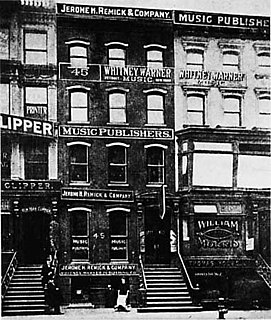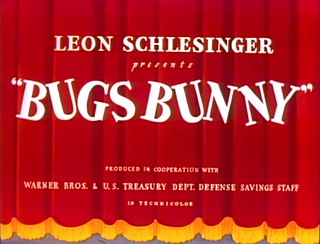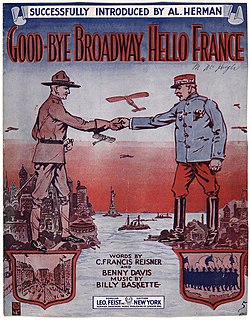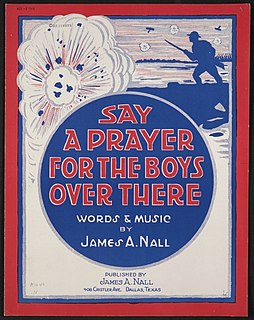Related Research Articles

Irving Berlin was an American composer and lyricist, widely considered one of the greatest songwriters in American history. His music forms a great part of the Great American Songbook. Born in Imperial Russia, Berlin arrived in the United States at the age of five. He published his first song, "Marie from Sunny Italy", in 1907, receiving 33 cents for the publishing rights, and had his first major international hit, "Alexander's Ragtime Band", in 1911. He also was an owner of the Music Box Theatre on Broadway. For much of his career Berlin could not read sheet music, and was such a limited piano player that he could only play in the key of F-sharp using his custom piano equipped with a transposing lever.

Tin Pan Alley is the name given to a collection of New York City music publishers and songwriters who dominated the popular music of the United States in the late 19th century and early 20th century. It originally referred to a specific place: West 28th Street between Fifth and Sixth Avenues in the Flower District of Manhattan; a plaque on the sidewalk on 28th Street between Broadway and Sixth commemorates it. In 2019, the New York City Landmarks Preservation Commission took up the question of preserving five buildings on the north side of the street as a Tin Pan Alley Historic District. The agency designated five buildings individual landmarks on December 10, 2019, after a concerted effort by the "Save Tin Pan Alley" initiative of the 29th Street Neighborhood Association.
"K-K-K-Katy" was a World War I-era song written by Canadian American composer Geoffrey O'Hara in 1917 and published in 1918. The sheet music advertised it as "The Sensational Stammering Song Success Sung by the Soldiers and Sailors", as well as "The Sensational New Stammering Song" The song was first played at a garden party fund-raiser for the Red Cross in Collins Bay on Lake Ontario. O'Hara was from Chatham, Ontario, and taught music at several universities.

"Any Bonds Today?" is a song written by Irving Berlin, featured in a 1942 animated propaganda film starring Bugs Bunny. Both were used to sell war bonds during World War II.
"Deep in the Heart of Texas" is an American popular song about Texas.

"Ain't We Got Fun" is a popular foxtrot published in 1921 with music by Richard A. Whiting, lyrics by Raymond B. Egan and Gus Kahn.
"I'll Get By " is a popular song with music by Fred E. Ahlert and lyrics by Roy Turk. The song was published in 1928. Versions by Nick Lucas, Aileen Stanley and, most successfully, Ruth Etting, all charted in America in 1929.
"I'm Beginning to See the Light" is a popular song and jazz standard, with music written by Duke Ellington, Johnny Hodges, and Harry James and lyrics by Don George and published in 1944.
"I Had the Craziest Dream" is a popular song which was published in 1942. The music was written by Harry Warren, the lyrics by Mack Gordon.

"After the Ball" is a popular song written in 1891 by Charles K. Harris. The song is a classic waltz in 3/4 time. In the song, an uncle tells his niece why he has never married. He saw his sweetheart kissing another man at a ball, and he refused to listen to her explanation. Many years later, after the woman had died, he discovered that the man was her brother.
"Hamp's Boogie Woogie" is a 1944 instrumental written by Milt Buckner and Lionel Hampton and performed by Lionel Hampton and His Orchestra. The song, featuring Earl Bostic on alto sax, hit number one on the Harlem Hit Parade and peaked at number eighteen. The song was number seven on Billboard's Annual High School Student Survey in 1945.
"At Mail Call Today" is a song written and recorded by American country music artist Gene Autry.

"Don't Sit Under the Apple Tree " is a popular song that was made famous by Glenn Miller and by the Andrews Sisters during World War II. Its lyrics are the words of two young lovers who pledge their fidelity while one of them is away serving in the war.

Good-Bye Broadway, Hello France is a 1917 song composed by Billy Baskette, with lyrics written by C. Francis Reisner and Benny Davis. The song was published by Leo Feist, Inc.

Say a Prayer for the Boys Over There is a song from 1918, written by James A. Nall. The song was originally performed by the Peerless Quartet and reached number on the top 100 US songs of 1918.

"Comin' in on a Wing and a Prayer" is a World War II song with lyrics by Harold Adamson and music by Jimmy McHugh, published in 1943 by Robbins Music Corp.

John Allan Wyeth served as a Lieutenant in the American Expeditionary Forces during World War I and subsequently became a war poet, composer, and painter. After the Armistice, Wyeth lived in Europe and became both a Post-Impressionist painter and a war poet.
A Fellow on a Furlough is a World War II song written by Bobby Worth in 1943 and published by House of Melody.
"On the Swing Shift" is a 1942 song composed by Harold Arlen with lyrics by Johnny Mercer for the film Star Spangled Rhythm, where it was introduced by Marjorie Reynolds, Betty Jane Rhodes and Dona Drake.
"Goodbye Mama " is a World War II song written and composed by J. Fred Coots. The wartime song was first published in 1941 by Chappell and Co. in New York, NY. The song has a march-tempo, 4/4 meter with some syncopated rhythm. The tune is cheery and akin to a Boy Scout hiking song.
References
- ↑ "IN Harmony: Sheet Music from Indiana".
- ↑ Smith, Kathleen E. R., God Bless America: Tin Pan Alley Goes to War, University Press of Kentucky, 2003, p.99.
- ↑ Herder, Ronald, 500 Best-Loved Song Lyrics, Dover Publications, 1998, p. 400.
- ↑ Wyeth (2008), This Man's Army: A War in Fifty-Odd Sonnets, pages xxxii, 13.
Bibliography
- Herder, Ronald, 500 Best-Loved Song Lyrics, Dover Publications, 1998. ISBN 048629725X
- Smith, Kathleen E. R., God Bless America: Tin Pan Alley Goes to War, University Press of Kentucky, 2003. ISBN 0813122562